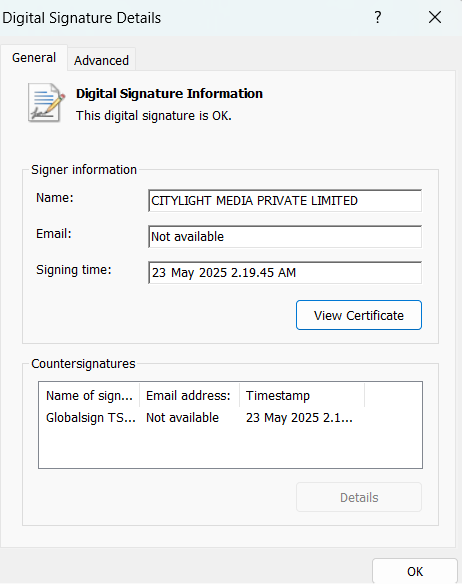Risk actors have been found disseminating a malicious, altered model of SonicWall’s SSL VPN NetExtender utility in a posh cyberattack that was found by a partnership between SonicWall and Microsoft Risk Intelligence (MSTIC).
NetExtender, a crucial device for distant customers, facilitates safe connections to company networks, enabling seamless entry to functions, file transfers, and community sources as if on a neighborhood community.
Misleading Marketing campaign Targets Distant Entry Software program
Nevertheless, this misleading marketing campaign hosts a Trojanized variant of NetExtender model 10.3.2.27 the newest official launch on a fraudulent web site mimicking SonicWall’s respectable platform.
The installer, digitally signed by “CITYLIGHT MEDIA PRIVATE LIMITED,” has been flagged as malicious by each SonicWall (GAV: Pretend-NetExtender [Trojan]) and Microsoft Defender Antivirus (TrojanSpy:Win32/SilentRoute.A).

Delving into the technical intricacies, the risk actors have tampered with two core elements of the NetExtender installer: NeService.exe and NetExtender.exe.
NeService.exe, the Home windows service liable for operating the NetExtender utility, features a perform for validating digital certificates of related elements.
Within the malicious model, this validation mechanism has been intentionally patched to bypass checks, making certain this system executes no matter certificates authenticity.
This tampering permits the compromised software program to evade early detection throughout set up.
Technical Breakdown of the Malicious Modifications
In the meantime, NetExtender.exe has been injected with extra malicious code designed to exfiltrate delicate VPN configuration information together with usernames, passwords, and area particulars to a distant server at IP handle 132.196.198.163 over port 8080.

This information theft is triggered as quickly as a person inputs credentials and clicks the “Join” button, with the stolen data present process customized validation by the malware earlier than transmission.
The implications of this assault are extreme, as compromised VPN credentials can grant attackers unauthorized entry to company networks, probably resulting in information breaches, lateral motion, and additional exploitation.
What makes this marketing campaign significantly insidious is the near-identical look of the pretend installer to the respectable software program, growing the probability of customers falling sufferer to the ruse.
SonicWall and Microsoft have responded swiftly by working to dismantle the impersonating web sites and revoking the fraudulent digital certificates utilized by the malicious installer.
Their proactive measures embrace deploying detection mechanisms in safety options to dam this risk at a number of layers.
To safeguard towards such assaults, customers are urged to train excessive warning and obtain SonicWall functions completely from trusted sources, particularly sonicwall.com or mysonicwall.com.
SonicWall’s Seize ATP with Actual-Time Deep Reminiscence Inspection (RTDMI™) and Managed Safety Providers are outfitted to establish and neutralize this risk, underscoring the significance of leveraging up to date safety instruments.
As cyber adversaries proceed to take advantage of trusted software program for nefarious functions, this incident serves as a stark reminder of the evolving risk panorama and the crucial want for vigilance in software program acquisition and community safety practices.
Indicators of Compromise (IOCs)
| Kind | Worth |
|---|---|
| SHA256 (Installer) | d883c067f060e0f9643667d83ff7bc55a218151df600b18991b50a4ead513364 |
| SHA256 (NEService.exe) | 71110e641b60022f23f17ca6ded64d985579e2774d72bcff3fdbb3412cb91efd |
| SHA256 (NetExtender.exe) | e30793412d9aaa49ffe0dbaaf834b6ef6600541abea418b274290447ca2e168b |
| Community (IP Deal with) | 132.196.198.163 |
Discover this Information Fascinating! Comply with us on Google Information, LinkedIn, and X to Get Instantaneous Updates

